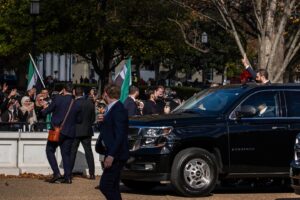
The National Interest Foundation Newsletter
Issue 309, November 14, 2025
Welcome to our NIF Newsletter. In this week’s edition, we examine Syrian President Ahmed Al-Sharaa’s visit to the United States for a meeting with Trump, while also looking into the situation in Nigeria and the reality of religious war.
Editor: Bassam Tarbush
President of Syria Visits the U.S. for a Meeting with Trump

On Monday of this week, Syrian President Ahmed Al-Sharaa met with his U.S. counterpart Donald Trump at the White House in what represented a landmark gathering between the two leaders. Analysts noted that the meeting – the first such visit by a Syrian president to the White House – signified another key step in the bolstering of U.S.-Syrian relations since the ousting of the Assad regime late last year. Some of the notable takeaways from the meeting included a Syrian commitment to join the U.S.-led global coalition to combat ISIS, a U.S. announcement of a fresh 180-day waiver of the Caesar Act sanctions, the resumption of formal diplomatic operations, and the agreement to move forward with plans to integrate the Syrian Democratic Forces (SDF) into the Syrian army, among other outcomes. Trump and Al-Sharaa had previously met in Saudi Arabia back in mid-May of this year, but the gathering this week was particularly significant as it formally established Syria as a new U.S. geopolitical partner and illustrated a major recalibration of U.S.-Syria relations following years of isolation.
One of the most noteworthy developments to come out of the White House meeting this week was a U.S. renewal of the 180-day waiver for the Caesar Act sanctions on Syria. The U.S. Treasury Department announced a new order to replace its previous May 23rd of 2025 waiver, and by doing so extended the suspension of the Caesar Act sanctions by another six months. Human rights advocates, Syrian officials, and others have long stressed the importance of sanctions removal in order to help facilitate the country’s reconstruction efforts, address severe humanitarian and economic hardships, and promote stability after decades of repressive rule under the previous Assad regime. While the sanctions were designed to isolate and pressure the Assad regime for its array of human rights abuses, they also contributed to widespread economic hardship among ordinary citizens. Thus, with the fall of the former government, the sanctions are seen as a harmful barrier to the prospects of Syria’s post-conflict recovery. Over the years, the sanctions have left 90% of the population living below the poverty line with major shortages of essential goods like food, water, fuel, and medicine. The lifting and freezing of sanctions have been welcomed as it will allow urgent humanitarian aid to enter more easily, while also paving the way for Syria to attain the billions of dollars it needs to rebuild its conflict-battered infrastructure by helping its economy reconnect with international commerce and the global financial system. Additionally, the moves – particularly as they come from a key entity on the world stage like the United States – signal that Syria is no longer a pariah state as it was under Assad and encourages countries to engage with the new Syrian government. While the U.S. has issued waivers to suspend the Caesar Act sanctions, many are still ultimately seeking a permanent repeal – which requires an act of U.S. Congress – something that Al-Sharaa and other new Syrian officials spent time advocating for during their visit to Washington.
Another substantial outcome from the meeting this week between Trump and Al-Sharaa was the announcement that Syria had officially joined the U.S.-led global coalition to combat ISIS. Syrian officials confirmed Damascus’ signing of what was labeled as a “political cooperation declaration,” which for now contains no military components and establishes their role in countering terrorism and supporting regional stability as a part of the initiative. With the agreement, Syria becomes the 90th country to join the coalition and will seek to contribute to the coordinated efforts to prevent the flow of ISIS fighters and cut off funding and financing for the group. Overall, experts have highlighted how the move is viewed as a significant step towards a new regional order which will continue to enhance already-growing intelligence sharing between the United States and Syria since the ousting of the Assad regime back in December of 2024.
For many observers, the Syrian government’s biggest diplomatic achievement as a result of the White House meeting this week is increased legitimacy in the eyes of the world. As analysts have pointed out, Al-Sharaa and the new regime have dedicated a great amount of time, effort, and resources into securing additional international recognition, and a landmark meeting with the American president is certain to bolster that. The visit to the White House indicates that the new Syrian government has garnered a striking level of global legitimacy that peace advocates hope will improve the prospects of stability in Syria.
Nigeria and the Reality of Religious War

U.S. President Donald Trump recently elicited alarm when he expressed that he was considering military action in Nigeria due to religious violence in the country. While Trump sought to characterize the situation there as simply one consisting of violence against Christians by Muslim extremists, analysts and experts were quick to point out that the reality on the ground is much more complex as both Christians and Muslims have been victims of violence at the hands of extremist groups like Boko Haram. In fact, while the level of violence against Christians has of course been deeply alarming, some monitoring organizations have indicated that the majority of victims of these groups in Nigeria have been Muslims. This has led human rights advocates to lament the false notion that religious violence in Nigeria is solely a case of Muslim-on-Christian attacks and that there is any type of purely one-sided persecution as a dangerous oversimplification of the crisis. On top of being a mischaracterization, it also risks fueling extremist propaganda and undermining efforts to curb the violence.
In actuality, violence in Nigeria is multifaceted and is partly driven by elements other than religion including disputes over access to land and resources. Factors such as climate change, competition for fertile land, and population growth have further exacerbated this issue in recent years. This has resulted in both Muslims and Christians being perpetrators of violence and victims of it. In Nigeria’s Middle Belt region, one of the major sources of violence is conflict between predominantly Muslim Fulani herders and largely Christian farmers regarding aforementioned access to land and resources – with this misleadingly being framed sometimes as a “religious conflict.” Furthermore, while abhorrent extremist groups like Boko Haram have certainly contributed to the escalation of violence, media outlets tend to often highlight their attacks on churches and Christian communities even as these terrorists are indiscriminate in their targeting of Christians, Muslims, and others.
The complex security crisis in Nigeria has prompted observers to reject the notion that it is somehow a systematic and nationwide religious war being perpetrated by one group against another. Analysis from reputable groups like the Armed Conflict Location & Event Data Project (ACLED) indicates that violence explicitly targeting Christians based on their religion accounts for a very small percentage (around 5%) of all violent incidents over the past five years. Instead, Nigerians of all faiths and ethnicities are victims of violence, and the majority of deaths actually occur in the country’s northern states – affecting Muslim communities in particular. The vast majority of incidents documented have been deemed to be over land and resource disputes, not specific targeting because of religious affiliation.
Human rights activists, faith leaders, civil society members, journalists, and others have argued that framing the violence in Nigeria as religious in nature is inaccurate. While there are undoubtedly serious security challenges that need to be better addressed by the government, these individuals have chronicled how an array of interreligious mixed communities peacefully coexist throughout the country. As one civil society member aptly put it, “We are indeed losing precious lives…But we’re losing them to terrorism, banditry, and communal conflicts fueled by poor governance, not a campaign to eliminate one faith.” Thus, labeling what is taking place in Nigeria as purely religious violence is harmful and will only fuel extremist elements of society. Rather than threaten direct military intervention, the withdrawal of aid, or sanctions, influential entities on the global stage like the United States should engage with the Nigerian government to help bolster its efforts to root out extremism by clamping down on the sponsors and financial backers of these groups – both within Nigeria and outside of the country. Ultimately, there is also the need to more effectively tackle the issues that are driving the troubling levels of extremism and insecurity in the first place such as poverty and unemployment.
